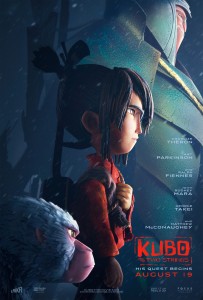If you must blink, do it now…
Kubo is a young boy who lives with his sometimes-catatonic mother in a cave by the sea. Every day he walks down to the village and entertains the villagers by telling stories using origami that comes to life when he plays his shamisen (a Japanese three-stringed instrument). There is a catch to Kubo’s existence: He must never ever stay out after dark. He soon figures out the reason when he stays out past dark and his evil spirit Aunts come to take him to his “grandfather” the Moon King, who intends to take Kubo’s remaining eye. With the help of a monkey and a beetle, Kubo must find his deceased father’s armor and defeat the Moon King.
This is another collaboration with my awesome friend Amy aka Catholic Girl Bloggin. My friend Amy’s writings will be in blue and my stuff will be in purple.
CGB Hits
I absolutely adore how imaginative this film is! Like the titular character, the world we are introduced to is brimming with creativity. I have always had a soft spot for Asian culture, so I appreciate that the story takes place in ancient Japan.
The first ten minutes has the best use of “show-don’t-tell” that I’ve seen in a long time. Yes, there is some opening narration from Kubo himself, but his dialogue is not an exposition spiel; rather the visuals are allowed to do all the talking. Any time the movie does resort to expositional dialogue, it is kept brief. Speaking of the visuals, the animation is–holy cow–just breathtaking! I turned to the friend who accompanied me and said, “Dude, that looks like real water!” There’s an impressive painting-come-to-life feel with the color palatte and the design of the locations that make the film a beauty to behold.
The story itself is truly inspired! Granted, the “adventures-of-a-half human-half celestial-child” story has been done before, but having him be a gifted storyteller who can bring origami to life with a musical instrument is quite an impressive twist. The most admirable quality of the film are the morals. I really like how Monkey tells Kubo, “Your magic is growing stronger. You need to learn control. But when we grow stronger the world grows more dangerous.” Trust me when I say that her statement holds a lot of truth.
Earlier this year, I reviewed the Jungle Book, in which I pointed out how the film reminded me of something a friend said to me, “Let the angels and the saints deal with the devil. They know what they’re doing.” Kubo and the Two Strings also brought those words to mind! Similarly to how our guardian angels tackle the evil one when he tries to mess with us, any time the hawkish evil spirit aunts come to harrass Kubo, Monkey and Beetle are there to fight them off while Kubo either accomplishes a task or seeks refuge. It is with their help that Kubo becomes strong enough and fully-equipped to finally take on the Moon King himself. Also, the climactic confrontation between Kubo and Moon King does come with an Eden-style temptation. Basically it’s the “join me and you will become like gods” thing, much like how the old serpent told Eve that if she ate the apple, she’d become like God. Between this and the Jungle Book, I’m pleasantly surprised to see that kids films come with an interest in the mysterious spiritual world.
MsOcampoWrites Hits
It’s so refreshing to find a movie for general audiences that has a completely original premise. My brother and I were obsessed with Japanese culture since we were kids and we were both looking forward to seeing this movie. It lived up to the expectations I had and then it blew me out of the water.
The animation is stunning, the characters are all enjoyable, and the writing is a breath of fresh air amongst the remakes and reboots out there. The movie does not play things safe and yet I would totally recommend this movie to basically everyone.
The central themes of this movie are about the importance of family and the power of a good story. Kubo goes on a journey to finish what his father started: to find the armor that will help him defeat the Moon King. Monkey, Beetle, and Little Hanzo all made for excellent travelling companions.
The Sisters were intimidating, frightening villains as well. I also love all the action sequences because there was a variety of them. The townsfolk play a great role as supporting characters who do more than just act as bystanders. I love that they accept Kubo’s gift and don’t treat him like an outsider like other movies would.
CGB Misses
The friend who came with me to see this movie had some questions about Kubo’s scary aunts. “If his grandfather is the Moon King, then are his aunts supposed to be stars or something?” This is just one of the film’s unanswered questions.
Also, is it just me or is the danger Kubo faces at the hands of his tyrannical grandfather lacking some weight? Let me explain: So essentially, if Kubo is caught by the Moon King and the hawk-women, then they will take his remaining eye…and then what? Are they gonna just leave him blinded on earth? Is he going to be made into a freaky spirit person like them? Also, other than being the product of his mother’s disobedience against the Moon King, why is the Moon King threatened by Kubo’s existence? Does the Moon King believe that Kubo being half-human, half-celestial mean that he [Kubo] will try to overthrow him? Now, to be fair, in their final confrontation, the Moon King does offer to take Kubo with him and make him an infinite being, but still, I think that if the threat had been written as “the Moon King’s gonna snatch Kubo’s other eye and enslave him,” or something like that, it would’ve helped.
Speaking of the Moon King, here’s my issue: I totally understand why he is a threat to Kubo, but the movie doesn’t make him seem like a threat to anyone else. The Moon King doesn’t seem to be feared by anyone else in the movie’s universe. In Harry Potter, Voldemort was a threatening presence regardless of whether or not Harry was around; it just so happened that he had his sights set on The Boy Who Lived and anyone associated with him. Here, though, it would have helped to see the Moon King burn down a village or require insane sacrifices or something; anything to raise the stakes of his existence.
MsOcampoWrites Misses
While I will say that all the actors did a great job in this movie, I wish that George Takei had more than just a cameo role. I also think that this movie could’ve been even better with Asian actors in the main roles. Matthew McConaughey’s acting is uneven, albeit has its own interesting brand of charm.
Elephant in the Room
MsOcampoWrites:
Right before we did this collab, one of my Facebook friends sent me an article from a well regarded Catholic news source that dismissed this movie and said that it promoted “neo-Pagan values.” As somebody who grew up watching Charmed, reads Harry Potter, and still watches Buffy, I think that the themes in this movie are just as Catholic as any Bible-based movie. For one thing, the central theme of this movie is the importance of family. While the main villains are Kubo’s grandfather and aunts, it’s reminiscent of Luke 12:53 “They will be divided, father against son and son against father, mother against daughter and daughter against mother, mother-in-law against daughter-in-law and daughter-in-law against mother-in-law.” The Moon King and his daughters are arrogant because they fail to comprehend things such as compassion and selfless love. Without going into spoiler territory, the ending of this movie shows justice and mercy rendered unto the Moon King, so the movie ends up teaching something that relates to the Year of Mercy as well.
Catholic Girl Bloggin:
Yes, I did see the article about Kubo promoting the occult and I will tell you that I didn’t see a single ouija board, tarot card, voodoo doll or anything occult-like in this entire movie. In fact, the villains were reminiscent of demons while Monkey and Beetle were basically Kubo’s guardian angels. If anything, the story borrows heavily from Greek mythology with hints of Shintoism. For the record, Shinto is a Japanese religion and given that the story does take place in ancient Japan, it only makes sense to borrow influence from a Japanese religion. So fear not, guys and gals, Kubo and the Two Strings is NOT pro-occult propoganda. Frankly, I don’t think the devil really cares about stop-motion animation and the film’s pro-family message would probably have him tripping over himself as he tries to flee.
I don’t think Kubo is in theatres now, but if it’s still showing, I highly recommend families with kids of all ages to check out this movie. If not, rent it from a Redbox or an on-demand streaming service when it comes out on DVD. It’s a great, original adventure that will take your breath away. And on top of that, it emphasizes the importance of family when dealing with a problem that’s more than a child can handle.
Venerable Takayama Ukon and Saint Paul Miki, pray for us.













